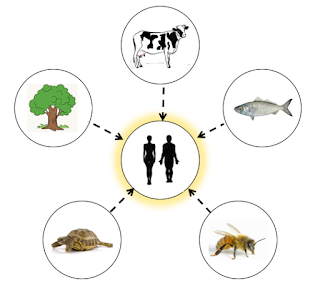A bit of theory: Mass nouns and mechanisms of erasure
By Rodrigo Cáceres
In two previous essays, we used a specific linguistic term to analyse environmental discourse: the "mass noun". We defined it as "an abstract concept that generalizes and homogenizes an ensemble of entities". And we gave two examples of mass nouns: Humans and Natural Resources (the links will take you to each respective essay). Other examples of mass nouns are: nature and environment.
Today I would like to shed some light onto the mechanisms by which mass nouns homogenize and generalize. Also, I would like to understand how they create erasure patterns. An erasure pattern is a "linguistic representation of an area of life as irrelevant, marginal or unimportant through its systematic absence or distortion in text" (Stibbe, 2015). If you remember, in those previous essays I used verbs such as "conceal", "hide" and "background".
Let's start! So first of all, we should note that the purpose of creating a "mass noun" word is to be able to incorporate many and diverse elements into a single word, so that one can convey all those elements at once. Thus, mass nouns are made to encompass rather than to scrutinize. In this way, with mass nouns we can make extremely general statements such as "humans depend on nature", which are truthful, but they tell us nothing about which specific elements of nature we depend on and to what extent. Thus they are simply not made to identify, their purpose is to represent the general instead of the particular.
So now we can come back to one of our examples: "Humanity is destroying Earth". Humanity is defined as "people in general" (Cambridge dictionary) and as "the totality of human beings" (Merriam-Webster dictionary). This second definition should be of particular interest because it evokes humanity as a mere collection of individual human beings. It is no surprise that this can take us in the direction of a "shared responsibility model" were everyone is equally responsible for environmental problems.
If we think about it, speaking about "humanity" does not evoke human beings as embedded in cultures that comprise institutions, social norms, religions and conventions that determine individual behavior. By extrapolating, it is oblivious to the fact that there is also a diversity of cultures, each of them having different institutions, social norms and so on.
Moreover, it conceals the existence of collective agents, such as corporations, nation-states and organizations in general that have real effects on the world.
All of this complexity of human worlds is flattened, left out of the frame when we evoke "humanity" as responsible for environmental problems.
But how does this happen? The cognitive linguist George Lakoff would say that it has to do with the way our brains work. I will come have to come back to this issue in a future post.
To sum up, mass nouns might be useful for general statements such as "Humans depend on nature". For our concerns, however, in important ways they prove to be insufficient and inadequate to provide a truthful picture of the multilevel complexity of environmental issues. To our understanding, mainstream use of "mass nouns" is counterproductive to a thorough understanding of environmental issues. Through mass nouns such as "We", "Humans" or "Humanity", mainstream discourse currently frames environmental issues at an individual and consumerist unitary level of analysis.
References
Stibbe, A. (2015). Ecolinguistics: Language, ecology and the stories we live by. Routledge.





Comments
Post a Comment